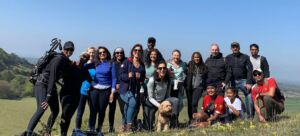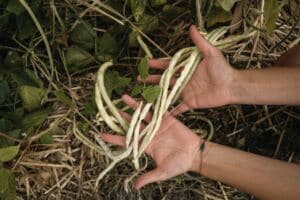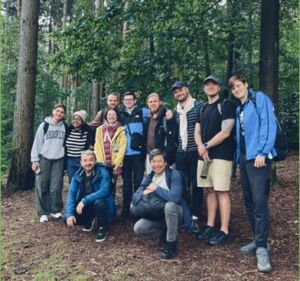How to bridge biodiversity and social vulnerabilities? Lessons learnt in the PLANET4B cases
By the end of 2023, the PLANET4B project has reached a significant milestone. Five learning communities and six stakeholder boards have been established to discover answers together to the question: how can biodiversity be prioritised in individual, community, and systemic decisions?
Our project aims to co-produce transformative change stories. with local actors, and then share these stories to increase motivation and foster behavioural change for biodiversity at broader scales. The learning communities – set up in five place-based, intensive cases – and the stakeholder boards – set up in six sectoral, extensive cases – are crucial to achieve this objective, as they provide the interface where key problems can be co-defined, shared values can emerge, and solutions can be co-created.

Learning community in the UK
Find your stakeholders
With the help of workshops, interviews, surveys and field visits, we got in contact with over a hundred relevant actors and engaged seventy-five individuals as members of the learning communities and stakeholder boards. To ensure marginalised voices are heard and elevated by PLANET4B, we paid special attention to intersectionality aspects, such as gender, age, ablism, ethnic and religious background, when reaching out to potential stakeholders.
Intersecting vulnerabilities required us to create safe spaces for engagement. For instance, the intensive case running in the Oslo Metropolitan area is committed to ensuring young people living with disabilities have access to green spaces. Here the Learning Community consists of peer mentors – disabled people who are trained to make nature experience inclusive for children and young adults with acquired disabilities – because their everyday knowledge of what it takes to make nature experiences accessible is indispensable.
Another example can be the extensive case on agrobiodiversity, where stakeholder interviews outlined a generally supportive policy environment but highlighted gender sensitive perceptions on seeds, which are rooted in worldviews, values, and internalised social norms. Here the Stakeholder Board consists of women only, including farmers, food and farming experts of different disciplines such as agriculture, nature conservation and artists who are dedicated to act upon their values and co-create a shared vision with the wider community.

Local variety of green bean in Hungary Photo: Nóra Várallyay
Engagement tailored to needs
The diversity of actors made it necessary to tailor the engagement process to their specific interests, needs and capabilities. In most cases one-to-one or group discussions were used as the main avenue to reach out to stakeholders. In the intensive case of Urban youth in Germany, however, boardgame nights and excursions were organised for young adults who have diverse ethnic and religious backgrounds. This deeply engaging and playful approach yielded in a sense of ownership and empowerment, i.e. participants were eager to continue active engagement and lead workshops themselves.

Urban youth learning community on expedition
The next milestone ahead
Reflecting on the achievements of 2023, the PLANET4B team has been inspired by the enthusiasm of our Learning Community and Stakeholder Board members. Their openness, curiosity, and inner drive has encouraged us to dig deeper in the root causes of the current environmental crisis. We can’t wait to continue our discussions – now with a stronger focus on leverage points and potential solutions.
